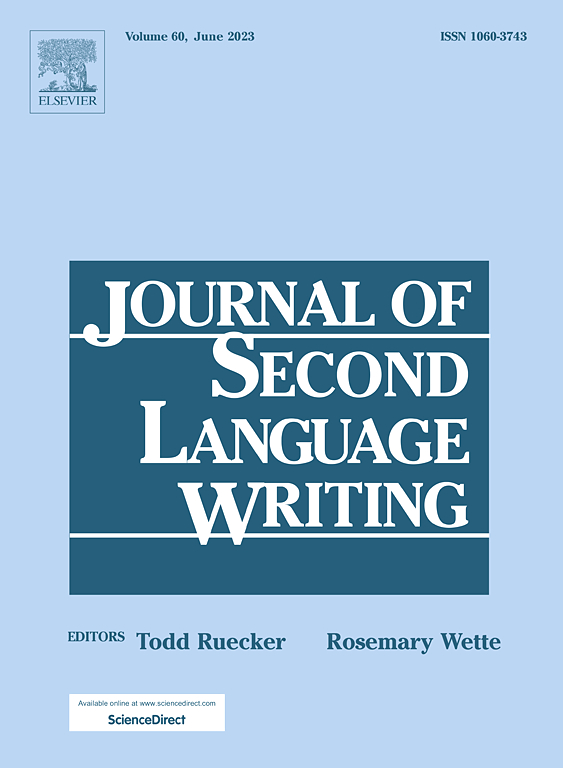Dialogic entanglements in researcher identity: A duoethnographic exploration of critical (self)reflexive moments of two transnational L2 writing scholars
IF 4.5
1区 文学
Q1 LINGUISTICS
引用次数: 0
Abstract
Utilizing duoethnography during a collaborative post-dissertation research period, this study investigates the evolving research skills and professional identities of two transnational second language (L2) writing teacher-scholars. Through critical reflection on their L2 writing teacher identity dissertation scholarship, the authors respond to calls for transparent and reflexive research that addresses the complexities of language teacher-scholar practices (Lee et al., 2022, Sánchez-Martín and Seloni, 2019) and decolonized methodologies in the field of Second Language Writing (Kubota, 2022). The authors explore how their transnational experiences, intersectional identities, and disciplinary expertise as L2 writing scholars shaped their understandings of reflexivity during and beyond their doctoral dissertation journeys. Their narratives highlight critical (self)reflexive moments, unpacking the development of diverse researcher reflexivity orientations (Olmos-Vega et al., 2022). The narratives culminate by showcasing the transformative journey of the authors’ researcher identities and positionalities at the nexus of TESOL/writing teacher educator (TE) and L2 writing teacher identity research. Key findings highlight the role of methodological, contextual, and (self)reflexivity in fostering decolonizing views of methodology and critical perspectives on L2 writing scholarship. The authors underscore the value of duoethnographic or narrative analytic strategies in addressing the political challenges inherent in transnational scholarship, doctoral mentoring, and academic writing.
研究者身份的对话纠葛:对两位跨国二语写作学者关键(自我)反思时刻的多民族志探索
本研究利用多民族志在论文后的合作研究阶段,调查了两个跨国第二语言(L2)写作教师学者不断发展的研究技能和专业认同。通过对他们的第二语言写作教师身份论文奖学金的批判性反思,作者回应了对透明和反思性研究的呼吁,这些研究解决了语言教师学者实践的复杂性(Lee等人,2022,Sánchez-Martín和Seloni, 2019)和第二语言写作领域的非殖民化方法(Kubota, 2022)。作者探讨了他们作为第二语言写作学者的跨国经历、交叉身份和学科专长如何在博士论文期间和之后塑造了他们对反身性的理解。他们的叙述突出了关键的(自我)反思时刻,揭示了不同研究人员反思取向的发展(Olmos-Vega et al., 2022)。在TESOL/写作教师教育者(TE)和第二语言写作教师身份研究的关系中,作者的研究者身份和立场的转变之旅达到了高潮。主要研究结果强调了方法论、语境和(自我)反思性在培养非殖民化的方法论观点和第二语言写作学术批判性观点方面的作用。作者强调了多元民族志或叙事分析策略在解决跨国奖学金、博士指导和学术写作中固有的政治挑战方面的价值。
本文章由计算机程序翻译,如有差异,请以英文原文为准。
求助全文
约1分钟内获得全文
求助全文
来源期刊

Journal of Second Language Writing
LINGUISTICS-
CiteScore
8.80
自引率
13.10%
发文量
50
审稿时长
59 days
期刊介绍:
The Journal of Second Language Writing is devoted to publishing theoretically grounded reports of research and discussions that represent a significant contribution to current understandings of central issues in second and foreign language writing and writing instruction. Some areas of interest are personal characteristics and attitudes of L2 writers, L2 writers'' composing processes, features of L2 writers'' texts, readers'' responses to L2 writing, assessment/evaluation of L2 writing, contexts (cultural, social, political, institutional) for L2 writing, and any other topic clearly relevant to L2 writing theory, research, or instruction.
 求助内容:
求助内容: 应助结果提醒方式:
应助结果提醒方式:


